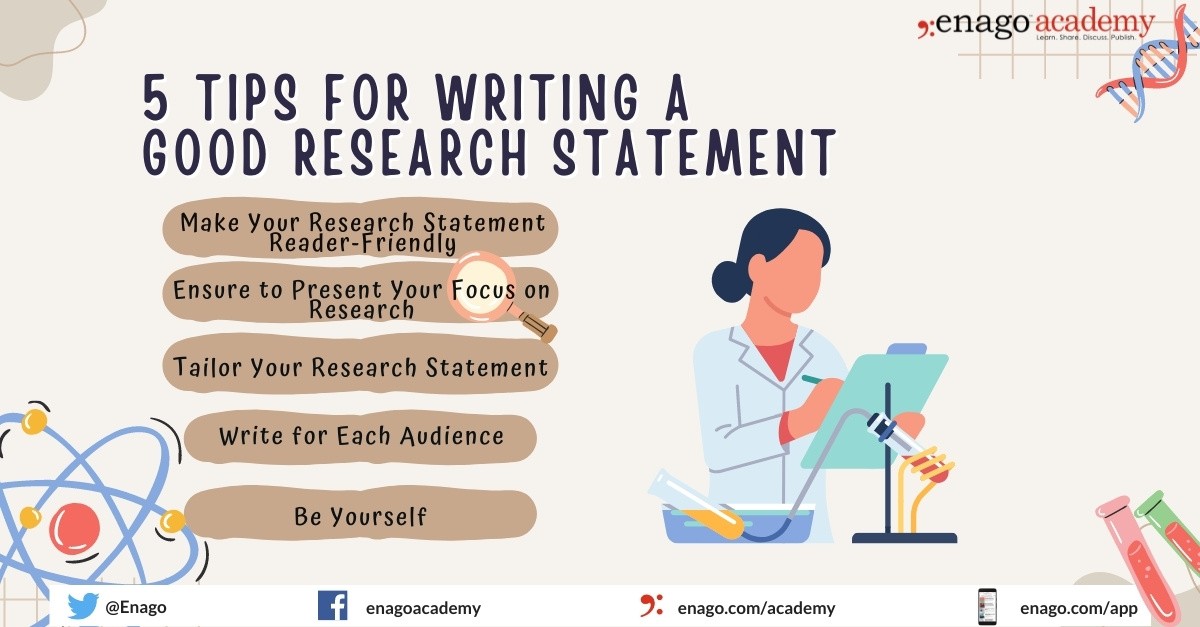5 Simple Tips for Writing a Good Research Statement for a Faculty Position

Completed your Ph.D.? What next?
Traditionally, most sought-after jobs after completing Ph.D. are university professors and industry R&D labs professionals. While industrial jobs have seen a surge in applicants to various positions, academia has prominently been the most considered field by Ph.Ds. As a part of the job application for faculty positions in academia, applicants are required to present a research statement that outlines the research they have already completed.
What is a Research Statement?
A research statement is a document that summarizes your research interests, accomplishments, current research, and future research conduction plans. Furthermore, it outlines how your work contributes to the field. It allows applicants to present the importance and impact of their past, current, and future research to their potential future colleagues. However, throughout your academic career, you may be asked to prepare similar documents for annual reviews, tenure packages, or promotion.
What is the Purpose of a Research Statement?
The purpose of a research statement isn’t just about exhibiting your research interests, achievement, or other academic feats. In fact, its purpose is to make a persuasive case about the importance of your completed work and the potential impact of your future trajectory in research. In other words, researchers must coherently write about their past and current research efforts and articulately present their future research plans.
Furthermore, a research statement’s purpose is to allow the search committee to envision the applicant’s research evolution, productivity, and potential contributions over the coming years. Your research statement must promisingly convey the benefits you bring to the position. In other words, these benefits could be in terms of grant money, faculty collaborations, student involvement in research, or development of new courses.
Three key purposes of a research statement are:
- Clear presentation of your academic feats.
- Description of your research in a broader context, both scientifically and societally.
- Laying out a clear road map for future endeavors concerning the newly applied position.
How is a Research Statement Different from a CV?
While your CV gives an overview of your past research projects, it does not address the details of conducted research or future research interests. Furthermore, a CV fails to answer some questions that can be easily answered through a research statement.
- Why are you interested in a particular research topic?
- Why is your research important?
- What techniques do you use?
- How have you contributed to your field?
- How can your research be applied commercially or academically?
- Does your research have an impact on allied fields?
- Is your research directing you to newer questions?
- How do you plan to develop new skills and knowledge?
What Should You Include in a Research Statement for Faculty Position?
With over hundreds of applications being received at various departments, your research statement must stand out from the crowd and address all points concerning the target position. Expectations for research statements may vary across disciplines. However, certain key elements must be included in a research statement, irrespective of the field.
- Academic specialty and interests.
- Dedication for research.
- Compatibility with departmental or university research efforts.
- Ideas about potential funding sources, collaborative partners, etc.
- Ability to work as a professional scholar.
- Capability to work as an independent researcher.
- Writing proficiency.
- Relevance of your research and its contribution to the field.
- Significant recognition received by your research such as publications, presentations, grants, awards, etc.
- Appropriate acknowledgment of other scholars’ work in your field by giving them credits where due.
- Degree of specificity for future research.
- Long-term and short-term research goals
How to Write a Research statement for Faculty Position?
An effective research statement must present a clear narrative of the relation between your past and current research. Additionally, it should clearly state how your research aligns with the goals, resources, and needs of the institution to which you are applying.
Here we discuss 5 simple tips for writing a good research statement:
 1. Make Your Research Statement Reader-Friendly
1. Make Your Research Statement Reader-Friendly
As stated earlier, a faculty position may easily receive over a couple of hundred applications. Consequently, the search committee may just glance through some applications. Therefore, you must make your research statement reader-friendly.
Following tips will allow readers to quickly determine why should they select you over other applicants:
- Organize your ideas by using headings and sub-headings.
- Space out different sections properly.
- Additionally, include figures and diagrams to illustrate key findings or concepts.
- Avoid writing long paragraphs in your research statement. Moreover, a concise yet thoughtfully laid out research statement demonstrates your ability to organize ideas in a coherent and easy-to-understand manner.
2. Ensure to Present Your Focus on Research
- Discuss feasible research ideas that interest you.
- Explain how your goals are related to your recent work.
- Additionally, mention your short-term (2-5 years) and long-term (5+ years) research goals.
- Discuss your ideas about potential funding sources, collaborative partners, facilities, etc.
- Specifically mention how your research goals align with your department’s goals.
3. Tailor Your Research Statement
- It is imperative to mention how you will contribute to the research at the institution you are applying to.
- Mention how will you use core facilities or resources at the institution.
- Furthermore, you should mention particular research infrastructure present at the target institution that you may need to do your work.
4. Write for Each Audience
- Even at top-most institutions, not all members of the search committee may be aware of the intricacies of your research work. Therefore, you should avoid jargon and describe your research work in a detailed yet lucid manner.
- Your motive must be to instill a sense of belief in the reader that you are a dedicated researcher and not overwhelm them with finer details.
- Moreover, focus on conveying the importance of your work and its contribution to the field.
5. Be Yourself
In an attempt to impress the search committee, applicants are often seen to go overboard and come out as boastful.
- Emphasize your major academic achievements.
- Be realistic and do not present research goals that are too ambitious.
- Finally, avoid comparing your research statement with other applicants.
Did you decide on the faculty position you want to apply for? How do you plan to go ahead with your research statement? Follow these tips while writing your research statement to acquire your most desired faculty position.









